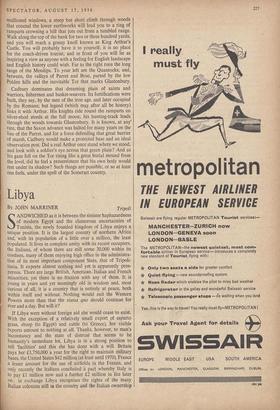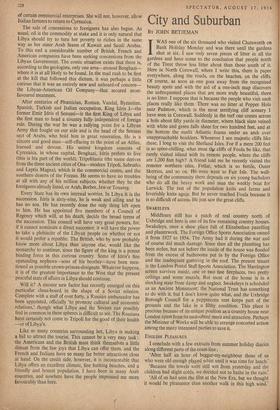Libya
SANDWICHED as it is between the sinister haphazardness of modern Egypt and the clamorous uncertainties of Tunisia, the newly founded kingdom of Libya enjoys a unique position. It is the largest country of northern Africa and, with its population of a little over a million, the least Populated. It lives in complete amity with its recent occupiers, the Italians, of whom there are still some 30,000 within its confines, many of them enjoying high office in the administra- tion of its most important component State, that of Tripoli- tania. It exports almost nothing and yet is apparently pros- perous. There are large British, American. Italian and French minorities, yet there is no friction with any of them. It is Young in years and yet seemingly old in wisdom and, most curious of all, it is a country that is entirely at peace, both within itself and without. Nothing would suit the Western Powers more than that the status quo should continue for ever and a day. But will it?
If Libya were without foreign aid she would cease to exist. With the exception of a relatively small export of esparto grass, sheep (to Egypt) and cattle (to Greece), her visible exports amount to nothing at all. Thanks, however, to man's Inconstancy and the state of distrust that seems to be humanity's immediate lot, Libya is in a strong position to sell 'facilities' and this she has done with a will. Britain Pays her £3,750,000 a year for the right to maintain military bases, the United States $42 million (at least until 1970), France a lesser amount for the use of airfields in the Fezzan, and only recently the Italians concluded a pact whereby Italy is to pay £1 million now and a further £2 million in lire later on : in exchange Libya recognises the rights of the many Italian colonists still in the country and the Italian ownership The sale of concessions to foreigners has also begun. As usual, oil.is the commodity at stake and it is only natural that Libya should try to turn her poverty to riches in the same way as her sister Arab States of Kuwait , and Saudi Arabia. To this end a considerable number of British, French and American companies have been seeking concessions from the Libyan Government. The comic situation exists that there is, according to the geologists, only one area—around Benghazi— where it is at all likely to be found. In the mad rush to be first at the kill that followed this dictum, it was perhaps a little curious that it was an entirely new and unheard-of concern— the Libyan-American Oil Company—that secured most- favoured treatment.
After centuries of Phoenician, Roman, Vandal, Byzantine, Spanish, Turkish and Italian occupation, King Idris I—the former Emir Idris el Senussi—is the first King of Libya and the first man to head a country fully independent of foreign rule. During the war he was a rallying point for a Libyan Army that fought on our side and is the head of the Senussi sect of Arabs, who hold him in great veneration. He is a sincere and good man—self-effacing to the point of an Attlee, learned and devout. His united kingdom consists of Cyrenaica, in whose capital, Benghazi, Idris prefers to live (this is his part of the world), Tripolitania (the name derives from the three ancient cities of Oea—modern Tripoli, Sabratha and Leptis Magna), which is the commercial centre, and the southern deserts of the Fezzan. He seems to have no troubles at all with any of his million subjects. whether they be the foreigners already listed, or Arab, Berber, Jew or Touareg.
Every State has its own internal worries. In Libya it is the succession. Idris is sixty-nine, he is weak and ailing and he has no son. He has recently done the only thing left open to him. He has appointed five members of a Council of Regency which will, at his death, decide the broad terms of the succession. This council will have very great powers, for, if it cannot nominate a direct successor, it will have the power to take a plebiscite of the Libyan people on whether or not it would prefer a republic. The British, who by now probably kn6w more about Libya than anyone else, would like the monarchy to continue, since the figure of the king is a potent binding force in this curious country. Some of Idris's fine upstanding nephews—sons of his brother—have been men- tioned as possible crown-princes-designate. Whatever happens, it is of the greatest importance to the West that the present peaceful state of affairs in Libya should continue.
Will it? A sinister new factor has recently emerged on this particular chess-board in the shape of a Soviet mission. Complete with a staff of over forty, a Russian ambassador has been appointed, officially 'to promote cultural and economic relations,' though what Libya and the Soviets can possibly find in common in these spheres is difficult to see. The Russians have certainly not come to Tripoli for the good of their health —or of Libya's.
Like so many countries surrounding her, Libya is making a bid to attract the tourist. This cannot be a very easy task : the Americans and the British must think themselves a little distant from the few joys that Libya can offer them, and the French and Italians have so many far better attractions close at hand. On the credit side, however, it is incontestable that Libya offers an excellent climate, fine bathing beaches, and a friendly and honest population. I have been in many Arab countries, and nowhere have the people impressed me more favourably than here.



































 Previous page
Previous page